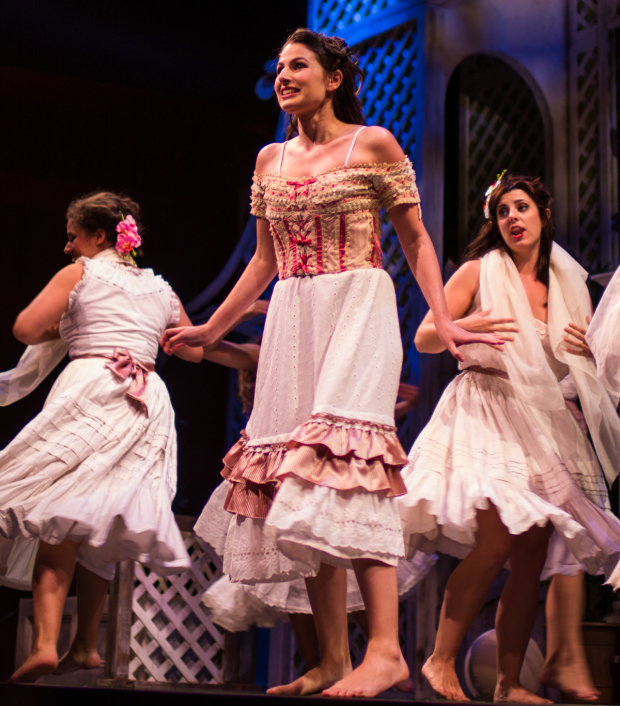The Golden Bride

(© Justin Scholar)
A magical example of musical-theater excavation is onstage at the Museum of Jewish Heritage, where the National Yiddish Theatre Folksbiene's Drama Desk Award-nominated revival of The Golden Bride has returned for a summer engagement. First presented by the Folksbiene in December 2015, this production brings to life a little-known Yiddish-language operetta from 1923 (the untranslated title is Di Goldene Kale), though it's originating year might just be the most surprising factor of all. With a delightful score that is fully integrated into its libretto, this charming piece predates early book-musical game-changers Show Boat and Oklahoma!, and is likely one of the genre's first examples.
With a score by Joseph Rumshinsky, lyrics by Louis Gilrod, and a libretto by Frieda Freiman, The Golden Bride tells the story of Goldele (Rachel Policar), a young woman abandoned as a little girl by a father who traveled to America and an absent mother. When Goldele discovers that she has inherited a million dollars from her father, she becomes the toast of the Russian Shtetl. Everyone wants to marry her, but she's really drawn to the student Misha (Cameron Johnson), who truly reciprocates her feelings. Goldele decides to take a ship to America in order to claim her fortune, and promises to marry whoever can find her long-lost birth mother, whom she's convinced is still alive.
Considering when Freiman wrote the script and the location in which it takes place, The Golden Bride is a surprisingly forward-thinking piece, particularly regarding its female characters. The headstrong Goldele takes her destiny into her own hands in an era when she otherwise wouldn’t have been allowed to do so. In the second act, Freiman explores subjects that seem deep for the period, the immigrant experience in America, as well as the nationalistic love for the post-Revolution "New Russia." (How could the writers have known that Stalin would come to power in 1924 and that the United States would try to limit Eastern European immigration at the same time?)
Perhaps the biggest discovery is the score, which came at the hands of musicologist Michael Ochs, who arranged the text for this production. Rumshinsky, one of the "big four" composers of the American Yiddish theater, crafted lush, delicate tunes brimming with Gilrod’s romantic, humorous lyrics. A 14-member orchestra beautifully performs it under the baton of conductor Zalmen Mlotek.
Codirectors Bryna Wasserman and Motl Didner (who received a 2016 Drama Desk Award nomination for this work) have guided the cast to trust the material and allow it to speak (and sing) for itself. The ensemble creates a fun evening that allows a peek into the Second Avenue theater scene of the roaring '20s. That said, The Golden Bride isn't a museum piece, and the company members infuse the show with fresh life, so it never once feels dusty.
Policar has a voice like a dream and finds a way to inject real stakes into a seemingly trivial storyline. It helps that Johnson, her scene partner, provides a beautifully stirring turn in the play's only real "dramatic" role. As the traditional musical secondary couple Khanele and Jerome (Rachel Zatcoff and Glenn Seven Allen) have a lovely flirtation in the first act that leads to an uproarious sequence later on, when they've both become over-the-top comic actors of the Yiddish stage. Adam B. Shapiro also steals his scenes as a proto-Yente the Matchmaker, who promises to couple up all the eligible maids in the household.
The evening comes with an impressively opulent physical production, with pleasing era and location-defining costumes by Izzy Fields (in the first act, it's traditional Russian shtetl-wear, while after the intermission, it's flapper dresses and American business suits); lighting by Yael Lubetzky helps accentuate the tones of the songs; and John Dinning provides a believable set that slyly transforms into a whole new location between acts.
Whether you call the The Golden Bride a book musical or an operetta (it fits both categories), it's a perfectly enjoyable and progressive example of theatrical history that's a treat to see live.










